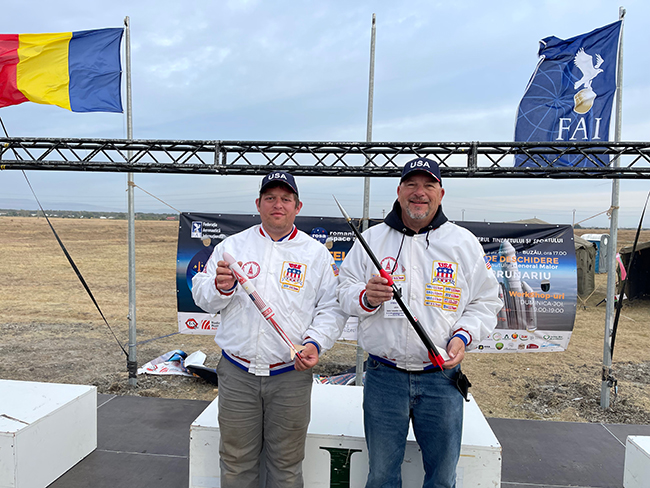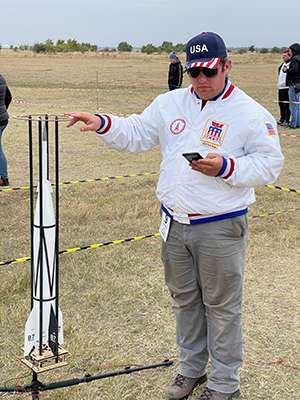
Matt Steele and Brian Muzek enjoy “healthy competition” in October’s World Championship for Space Models
Dec. 21, 2021 – HUNTSVILLE, Ala. – Rocket hobbyists are not to be confused with professional rocket scientists.
That is, of course, unless they’re one and the same.
“I get to do big rockets for my job and little rockets for fun,” said Matt Steele, a business development director for Aerojet Rocketdyne’s Defense Business Unit, where rockets are serious business.
Steele was one of two Aerojet Rocketdyne employees who traveled to Romania this past October to compete as part of the U.S. team in the World Championships for Space Models. The biennial event, sponsored by the Federation Aeronautique Internationale, attracts hundreds of enthusiasts from all over the world.
Steele managed the U.S. team in the 2021 championship, which was postponed from 2020 and drew a smaller than usual field due to coronavirus-related restrictions. Also on the team was Brian Muzek, a senior engineer with Aerojet Rocketdyne’s mission architecture group, who took 8th place in the S8E/P Radio Controlled Glider Event, which requires contestants to guide a rocket-launched glider to a precise spot on the ground.
“It’s a rocketry extravaganza – every day there are hundreds of rockets going up into the air,” said Muzek, who also had an entry in the S9A Helicopter Duration event. “That in itself is a spectacle.”
One might think that people who do rockets for a living – Muzek’s work includes designing trajectories for missions to Mars, for example – would have an unfair advantage over the others. But that’s not necessarily the case, as both he and Steele will attest.
Although the competition does draw some professional rocket scientists, most hail from other walks of life and became good at what they do through some combination of talent, creativity and practice. The U.S. team, for example, included an emergency room doctor and an undertaker who Muzek said is known among his peers as a “glider guru.”

Brian Muzek “in the zone” at the World Championship for Space Models in Romania
Regardless of their day jobs – some of the internationals are paid model rocketeers, Steele said – the competitors are formidable.
Five years ago, Steele took home the gold medal in the S5C Scale Altitude event with a model of a Black Brant sounding rocket that reached an altitude of 460 meters.
In some events, it’s not how high up you go but how you come down that counts. In the helicopter and parachute duration events, for example, the key is to time the launch so as to be able to catch air thermals, or updrafts, that help keep the model aloft for as long as possible after its motor burns out.
Anticipating these thermals can be a bit of a mysterious art that relies on ground-based sensors and guesswork, Steele said. “There’s a lot of finesse involved,” he said. ”It’s not automatic and it’s not easy.”
The competition rules, meanwhile, can be as unforgiving as gravity itself.
Steele said he missed the fly-off round in the S3A Parachute Duration event because his model’s descent in one of its three first-round flights failed to last the required five minutes. It didn’t matter that on another flight, the model caught an updraft and soared out of sight some 30 minutes after parachute deployment, he said. There’s no extra credit for going beyond five minutes, he added.
For both Steele and Muzek, being part of the international competition was its own reward. Although the prizes go to individuals, there is considerable teamwork involved, they said. Tracking, retrieving and preparing rockets for their next flight is a team effort that requires communication via walkie-talkies and multi-mile treks on foot over rough terrain, Steele said.
The camaraderie among the competitors transcends international borders. “There’s healthy competition but it’s really fun to get together with people from all over the word who share a passion for what you do,” Muzek said.

